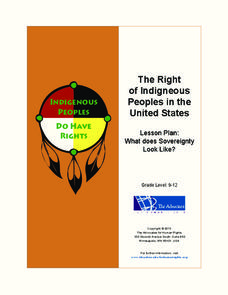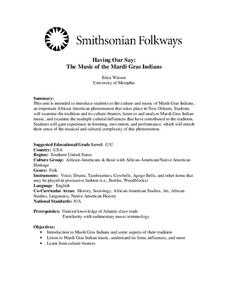Stanford University
The Gold Rush and San Francisco
The California Gold Rush rewrote the history of the American West, but especially that of San Francisco. After analyzing images of the city and primary sources, such as a diary entry, scholars discuss these changes. Scaffolded questions...
Curated OER
Ancient Gold Working
Students create a sculpture inspired by the masks, pendants, or human and animal forms found in ancient Indian art of the Americas. They focus on the techniques of metalworking, especially repousse.
Curated OER
In Pursuit of the American Dream
Students compare and contrast assimilation and acculturation. They explain the idea of "The Melting Pot" as it relates to what it means to be American. They write an 8 page response paper on a selected author.
Curated OER
La Leyenda de Betsy Ross
Is your native Spanish-speaking class learning about American legends and the history of the United States? Introduce them to Betsy Ross, the woman often credited for the making of the first American flag! After reading the short...
Curated OER
Mount Rushmore
How did those faces get on that mountain, and why did they choose those particular presidents? Learn about Mount Rushmore's construction and the history behind the men represented on the mountainside with a short reading passage and set...
Smithsonian Institution
World War I
How did World War I effect the United States' status as a world power? Pupils examine a website to learn many interesting facts about American involvement during World War I. They read passages and interact with artifacts in an online...
Library of Congress
The Harlem Renaissance
The Harlem Renaissance brought forth many American art forms including jazz, and the writings of Zora Neale Hurston and Langston Hughes. Using a carefully curated set of documents from the Library of Congress, pupils see the cultural...
Voices of a People's History
Voices in The Classroom
Everyone's perspective of the past is different. A thought-provoking unit gives young academics the opportunity to explore their perspectives on history and their neighborhoods. Based on the work of Howard Zinn, each lesson explores...
Stanford University
Iwo Jima
What does the American flag represent to different people? An interesting assessment is a useful tool for teaching about primary sources. Academics analyze a photo of the flag raising at Iwo Jima to explain its significance to history....
National Endowment for the Humanities
Frances Ellen Watkins Harper’s “Learning to Read”
Frances Ellen Watkins Harper's poem "Learning to Read" is the focus of a lesson that teaches middle schoolers how to do a close reading of a text. The lesson introduces them to a brief biography of the poet, includes a video reading, and...
Curated OER
Understanding King's Use of Metaphors in the
One of the most famous and well-crafted speeches of all time, Dr. Martin Luther King, Jr.'s "I Have a Dream" speech, consists of rich metaphors and rhetorical language. Using a provided graphic organizer, students analyze five quotes...
Curated OER
A 'Stone of Hope'
Kids uncover the who, what, when, where, and why regarding the dedication of the Martin Luther King National Memorial. They read the provided New York Times article and then answer each of the 10 comprehension questions.
Smithsonian Institution
We Have a Story to Tell: Native Peoples of the Chesapeake Region
How did colonial settlement and the establishment of the United States affect Native Americans in the Chesapeake region? Your young historians will analyze contemporary and historical maps, read informational texts, and work in groups to...
Syracuse University
Erie Canal
While canals are not the way to travel today, in the first half of the nineteenth century, they were sometimes the best way to move goods and people. Scholars examine primary sources, including maps and pictures, to investigate the role...
Benjamin Franklin Tercentenary
The Autobiography of Benjamin Franklin
Need a model for character education? Benjamin Franklin presents himself as in a constant state of striving to become the man he hoped to be, making his autobiography is far more accessible to learners than those of people who consider...
Alabama Department of Archives and History
Birmingham: The Magic City
Why is Birmingham known as the magic city? A comprehensive lesson plan provides hands-on activities, group discussion, and writing exercises to teach young historians about the importance of the city of Birmingham. Scholars learn the...
Advocates for Human Rights
The Right of Indigneous Peoples in the United States
The sovereignty of U.S. Native American nations is the focus of a resource that asks class members to compare the Right to Self-Determination in the UN Declaration on the Rights of Indigenous Peoples with a fact sheet that details the...
San Francisco Symphony
Ballads for Americans
"Ballad for Americans" was a song written for performers participating in the Federal Arts Project, during The Depression. Learners will analyze the lyrics of the song and then create informational posters about other Federal Works...
Smithsonian Institution
The Music of the Mardi Gras Indians
The traditions, costumes, and the music of the Mardi Gras Indians, African-Americans and those with African American or Native American Heritage are the focus of a unit that introduces class members to a little-known group that plays a...
Reading Through History
Anti-Federalist Paper No. 47
The path to a more perfect union was rockier than most history books would lead you to believe. Young historians read “Antifederalist No. 47,” written by James Madison (under the pen name “Centinel”), which sharply criticizes the...
DocsTeach
WWI America: Babe Ruth's Draft Card
Even the Great Bambino wasn't above suspicion during World War I. An eye-opening activity explores America's greatest pastime through the lens of government officials during WWI. Academics examine Babe Ruth's draft card to understand how...
Curated OER
Central American Immigrants to the United States: Refugees from Unrest
Students identify the major aspects of Olmec and Mayan civilzations, including economic, political, and religious. They list contributions of these civilizations. Students identify the Central American countries where the United States...
Curated OER
Queen Anne's War and Its Impact on Deerfield
Class members read a series of primary and secondary source materials to examine the effects of Queen Anne's War, also know as the War of Spanish Succession, on the Pocumtucks and other Native Americans in the area of Deerfield, MA.
K12 Reader
African American Inventors: Patricia Bath
Young readers practice their comprehension skills by responding to a series of text-based questions on a passage about Patricia Bath, the first black woman medical doctor to receive a patent.
Other popular searches
- Native American History
- South American History
- African American History
- History of American Women
- Central American History
- Ancient American Cultures
- African+american+history
- 1800s American History
- 1700s American History
- African American History
- Early American History
- African American History Month

























